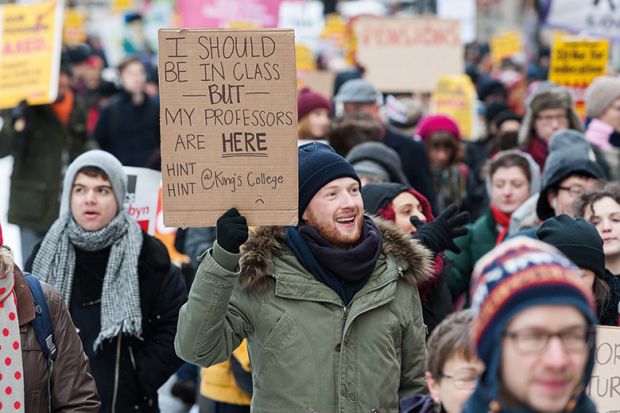More than 5,000 students have now joined a legal bid to force UK universities to pay millions of pounds in compensation for teaching time lost during the pensions strike.
Asserson, the law firm coordinating the claim, estimated that the 65 higher education institutions that were affected by the walkouts in February and March could have to pay out a total of £5 million – equivalent to about £1,000 per student involved in the action – and claimed that this figure could rise to £20 million. Five hundred students are joining the litigation each week via a website, the company said.
The claim focuses on concerns that students paid a significant sum in exchange for tuition, a portion of which was not provided. One million students were estimated to have been affected by the 14-day strike, during which 575,000 teaching hours were expected to have been lost.
Shimon Goldwater, a senior solicitor at Asserson, said that the compensation claim was “building rapidly”.
Universities have urged students to use their complaints systems, but Mr Goldwater said that this had proved ineffective so far.
“Students are telling us that they have been following advice from their unions and the universities to use standard complaints procedures when asking for compensation, with absolutely no sign of progress. In fact, we have not heard of a single instance of a student receiving proper financial compensation for cancelled teaching time,” Mr Goldwater said.
“Universities are presumably hoping that this problem will go away, but this claim shows that thousands of students are not willing to sit by and pay for a service that was cancelled.”
Asserson said that institutions facing the largest numbers of claims were the University of Nottingham (446 students), Durham University (371), the University of Kent (295), King’s College London (265) and the University of Bristol (256).
The company highlighted that universities had saved millions of pounds by deducting the salaries of academics who took part in the action.
Universities UK has previously advised students that there is no need to use lawyers when institutions were able to deal with complaints on a case-by-case basis and that, if they are unhappy with the process, they can take their claim to an ombudsman such as the Office of the Independent Adjudicator.
Universities were also forced to consider resetting examinations because of the action.




